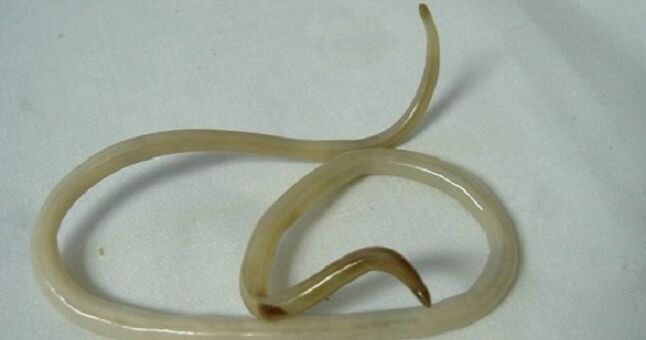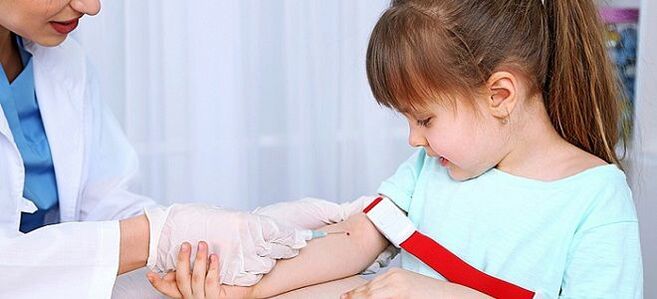
Anyone can be infected with parasites, but babies are especially affected by them, and the risk is especially high in the summer. There are different types of worms, but all of them have a negative impact on health. Parents need to know what worms are in children - below we will look at the symptoms and treatment of a disease such as helminthiasis.
Types of worms in humans
There are 12, 000 worms on our planet (also called helminths). They live in soil, food and animals, and can live in the human body about 200 species. Parasites should always be the host and often choose babies for habitat. When a child gets to know the world, he tastes everything he can, so he is always at risk.
The most common types of worms in children are nematodes or roundworms. These include:
- Round wormcauses ascariasis. Helminths can grow up to 40 cm in length. They parasitize the gastrointestinal tract and small intestine.
- Pinwormscauses enterobiosis. The worms are small (less than 1 cm long) and whitish-yellow. Such helminths live in children in the intestine or small intestine. Their lifespan is up to 4 weeks.
- Cestodes- These are tapeworms that parasitize the intestines and various organs. Helminths cause diseases such as teniosis, echinococcosis, hymenolepiasis, teniarinhoz and diphyllobotriasis.
- Trematodesflatworms or trematodes. These include feline fluke, paradoxical leukochloridium, schistosome. Parasites provoke diseases such as fascioliasis and opistorchiasis.
Ways of infection with worms
According to official medical statistics, worms occur in 80% of children under 2 years of age and preschool children attending educational institutions. These official figures were recorded in those babies who underwent laboratory tests. Helminths use all means to enter the human body. The most common ways of infection are:
- contact with dirty hands or infected animals;
- poorly washed fruits or vegetables;
- raw water;
- poorly processed fish or meat.
How do you know if a child has worms?
To answer the question of what worms are in children (symptoms and treatment are determined by the type of helminths), you need to know how the infection occurs and what internal organs the parasites enter. Very often they do not manifest themselves in any way, and the disease persists in a latent form, so the doctor can not always determine their presence. Helminths live in the human body for years and even decades, adapting to the most unfavorable conditions.
Common symptoms of worms in children may include:
- morning sickness;
- anal itching;
- headaches;
- bruxism - is the clenching of teeth in sleep;
- plenty of saliva at night;
- dizziness;
- nasal polyps;
- inflammation of the genitals;
- periodic pain around the navel;
- sheep feces, diarrhea or constipation;
- anorexia;
- pallor of the skin.
If you find more than five of the listed symptoms in your child, then it is worth suggesting a helminthic invasion. Anyone can be a carrier of various helminths that parasitize the body and cause intoxication and serious diseases. Symptoms may change with the activation of parasites. When you suspect worms in children, the symptoms may also appear with external signs:
- "chickens" (rashes) on the thighs or forearms;
- bruises and circles under the eyes;
- early caries;
- lack of body weight;
- fragility of nails and hair;
- growth disorders;
- allergic reactions.
In children, worms can affect the nervous system:
- babies get nervous;
- decreased concentration;
- perseverance is lost;
- sleep is disturbed.
What do worms look like in a child's feces?
Young parents are often interested in the question of how to detect worms in the feces of a child. In fact, only large worms can be seen in children's feces. Parasites leave the body in the form of clots, which are only a few individuals. If you see external inclusions, then it is better to contact a specialist and perform tests to rule out the presence of parasites.
Tests for worms in children
When parents suspect worms in children, the symptoms and treatment depend on the stage of the disease. The child should be taken to a gastroenterologist or pediatrician to determine the diagnosis. The doctor conducts an initial examination and prescribes an examination that includes:

- enzyme immunoassay - helps to recognize the type of worm and its presence, for which the child receives blood from a vein on an empty stomach;
- blood test for helminths in children - the main indicators are: the number of eosinophils, the presence of anemia and color;
- scratching, smear for enterobiasis - taken from the anus;
- General analysis of feces for eggs and dysbacteriosis is carried out in 3 stages, because some species of worms do not lay eggs regularly;
- computed tomography, X-ray or ultrasound examination - is performed to detect the presence of worms in the human body.
The child has worms - what to do?
Once the diagnosis is confirmed, the doctor prescribes treatment for worms in children, medications should be strictly agreed with the doctor), talks about folk remedies and products that should be used for rapid recovery. Parents should be aware that it is not possible to self-medicate babies, as this can lead to irreversible consequences and thus worsen the child's condition.
If you do not know how to get rid of worms in children, then contact a specialist who will prescribe you several stages of therapy. They include:
- body preparation - in this case sorbents and antihistamines are prescribed;
- anthelmintic therapy - traditional medicines for parasites, which can be in the form of tablets, suppositories or suspensions;
- cleanse the body - enemas, choleretic drugs or sorbents.
Treatment of worms in children is carried out at home in the absence of any complications in the form of infectious lesions. During the whole period, the child must follow a special diet. After the first course of therapy, the child is re-examined and tested. If they again show the presence of parasites in the body, then the drug is re-prescribed.
Tablets from worms for children
Currently, there are several medications that can help you get rid of worms. They are available in tablets and are intended for babies. Consult a specialist before use.
Worm suspension for children
If your child is still small and does not know how to take the pills, then specially prepared suspensions are suitable for him.
Folk remedies against worms in children
It is not possible to get rid of parasites completely with the help of traditional medicine, but you can increase immunity and speed up treatment. A remedy for worms in children should be taken with caution and only with a doctor's permission. The most popular products are:
- garlic;
- pumpkin seeds;
- carrot juice;
- vegetable oil;
- infusions of celandine and wormwood or tansy.
Prevention of worms in children
All parents should know that deworming tablets can be given to children to prevent the creation of a special microflora that helminths simply cannot exist.
To prevent parasites, you should do the following:
- Follow the rules of personal hygiene.
- Wash your hands with soap and water after using the toilet and walking.
- Fight flies.
- Keep pacifiers and toys clean.
- Iron clothes and linen.
- Manage food carefully.
Depending on the age of the baby, there is a difference in the prevention of worms in children, the drug begins to be given only at 6 months.
























